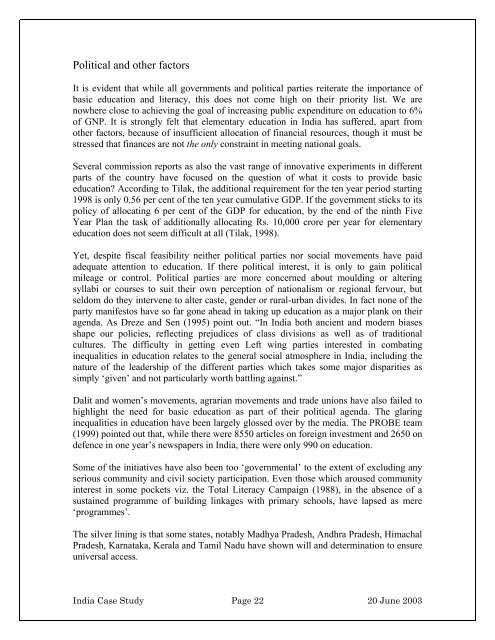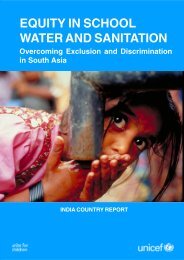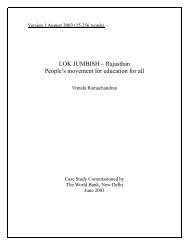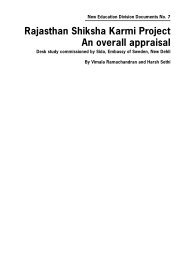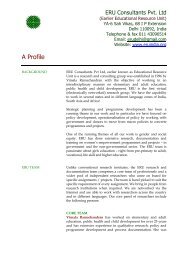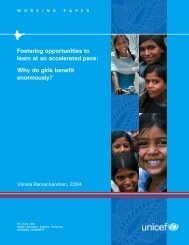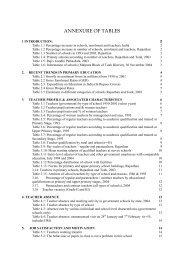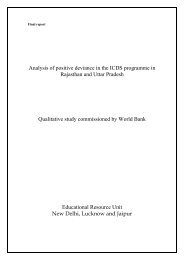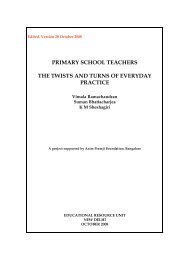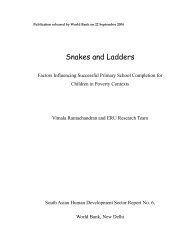Where are we today with respect to girls' education
Where are we today with respect to girls' education
Where are we today with respect to girls' education
- No tags were found...
You also want an ePaper? Increase the reach of your titles
YUMPU automatically turns print PDFs into web optimized ePapers that Google loves.
Political and other fac<strong>to</strong>rsIt is evident that while all governments and political parties reiterate the importance ofbasic <strong>education</strong> and literacy, this does not come high on their priority list. We <strong>are</strong>nowhere close <strong>to</strong> achieving the goal of increasing public expenditure on <strong>education</strong> <strong>to</strong> 6%of GNP. It is strongly felt that elementary <strong>education</strong> in India has suffered, apart fromother fac<strong>to</strong>rs, because of insufficient allocation of financial resources, though it must bestressed that finances <strong>are</strong> not the only constraint in meeting national goals.Several commission reports as also the vast range of innovative experiments in differentparts of the country have focused on the question of what it costs <strong>to</strong> provide basic<strong>education</strong>? According <strong>to</strong> Tilak, the additional requirement for the ten year period starting1998 is only 0.56 per cent of the ten year cumulative GDP. If the government sticks <strong>to</strong> itspolicy of allocating 6 per cent of the GDP for <strong>education</strong>, by the end of the ninth FiveYear Plan the task of additionally allocating Rs. 10,000 crore per year for elementary<strong>education</strong> does not seem difficult at all (Tilak, 1998).Yet, despite fiscal feasibility neither political parties nor social movements have paidadequate attention <strong>to</strong> <strong>education</strong>. If there political interest, it is only <strong>to</strong> gain politicalmileage or control. Political parties <strong>are</strong> more concerned about moulding or alteringsyllabi or courses <strong>to</strong> suit their own perception of nationalism or regional fervour, butseldom do they intervene <strong>to</strong> alter caste, gender or rural-urban divides. In fact none of theparty manifes<strong>to</strong>s have so far gone ahead in taking up <strong>education</strong> as a major plank on theiragenda. As Dreze and Sen (1995) point out. “In India both ancient and modern biasesshape our policies, reflecting prejudices of class divisions as <strong>we</strong>ll as of traditionalcultures. The difficulty in getting even Left wing parties interested in combatinginequalities in <strong>education</strong> relates <strong>to</strong> the general social atmosphere in India, including thenature of the leadership of the different parties which takes some major disparities assimply ‘given’ and not particularly worth battling against.”Dalit and women’s movements, agrarian movements and trade unions have also failed <strong>to</strong>highlight the need for basic <strong>education</strong> as part of their political agenda. The glaringinequalities in <strong>education</strong> have been largely glossed over by the media. The PROBE team(1999) pointed out that, while there <strong>we</strong>re 8550 articles on foreign investment and 2650 ondefence in one year’s newspapers in India, there <strong>we</strong>re only 990 on <strong>education</strong>.Some of the initiatives have also been <strong>to</strong>o ‘governmental’ <strong>to</strong> the extent of excluding anyserious community and civil society participation. Even those which aroused communityinterest in some pockets viz. the Total Literacy Campaign (1988), in the absence of asustained programme of building linkages <strong>with</strong> primary schools, have lapsed as mere‘programmes’.The silver lining is that some states, notably Madhya Pradesh, Andhra Pradesh, HimachalPradesh, Karnataka, Kerala and Tamil Nadu have shown will and determination <strong>to</strong> ensureuniversal access.India Case Study Page 22 20 June 2003


